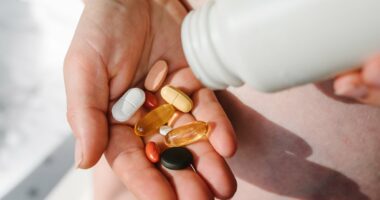Share this @internewscast.com
To discover what type of coffee is best for the appearance and overall health of our teeth, we consulted Dani Benyaminy, DDS, a cosmetic dentist based in Los Angeles.
How coffee impacts dental health
You likely already know that coffee isn’t stellar for our teeth… but do you know why, exactly? To start, a primary concern is the drink’s potential to cause staining. “Coffee contains pigments called tannins—also found in wine and teas—that can adhere to the tooth enamel, leading to discoloration over time,” Dr. Benyaminy explains. He notes that your pearly whites can become, well… less than pearly white within weeks or months of consistent coffee consumption. “People who sip and really let the coffee sit in their mouth are at even higher risk for more stains,” he adds. (So much for savoring.)
But discoloration isn’t the only potential hazard of drinking your daily brew. Since coffee is acidic, prolonged or excessive exposure can weaken tooth enamel, thus increasing the risk of tooth sensitivity and decay. “Acidic beverages like coffee can also contribute to the erosion of the tooth enamel, making the teeth more susceptible to damage,” Dr. Benyaminy adds.
What’s the best type of coffee for teeth and dental health?
Since exposure to highly acidic substances is a key driver of weakened enamel, it makes sense that the lower the acidity of your beverage is, the better it’ll be for your dental health.
“When it comes to the best type of coffee for your teeth, less acidic options like cold brew or [other] low-acid coffees are generally considered better choices,” says Dr. Benyaminy. If you prefer your coffee hot, opt for dark roasts or espresso. (Additional hacks to reduce the acidity of your coffee include adding baking soda and diluting it with extra water.) “The reduced acidity helps minimize enamel erosion and tooth sensitivity,” Dr. Benyaminy continues. Moreover, switching to these types of coffee won’t only have a positive impact on your dental health; doing so can also move the needle to improve the appearance of your teeth.
“When it comes to the best type of coffee for your teeth, less acidic options like cold brew or [other] low-acid coffees are generally considered better choices,” says Dr. Benyaminy. If you prefer your coffee hot, opt for dark roasts or espresso.
Read Related Also: Malawi battles outbreak of scabies that health experts link to climate crisis
Additional dental health tips for coffee drinkers
Prioritizing coffee that’s less acidic than your usual go-to isn’t the only hack you can employ to improve the look and health of your teeth. To promote a healthier, brighter smile, aim to heed the following dentist-approved tips:
Use a (reusable) straw
Since straws help minimize a beverage’s direct contact with teeth, it’s worth investing in reusable straws (or opting for eco-friendly straws at your local cafe) as you sip on cold brew and other acidic bevs like sparkling water, soda, and certain juices.
Rinse your mouth after drinking coffee
Habitual coffee drinkers can make positive strides in their dental health by making it a habit to do a quick swish and spit after caffeinating. According to Dr. Benyaminy, doing so can help neutralize acidity and help remove any lingering residue.
Drink coffee before brushing your teeth
If your morning routine includes finishing off a mug of coffee and then proceeding to brush your teeth, you’ll want to reverse your routine, stat… or at least build in a bit of buffer time. “Wait at least 30 minutes after drinking coffee before brushing your teeth,” Dr. Benyaminy advises. “This allows the saliva to naturally remineralize the teeth and reduce the risk of enamel damage.”
Maintain good oral hygiene
Dental and oral health should remain an ongoing priority, rather than something you’ll address only after a specific issue arises. On top of heeding the tips shared above—and whether or not you drink coffee regularly—be sure to brush and floss regularly and visit your dentist for your requisite check-ups and cleanings.














